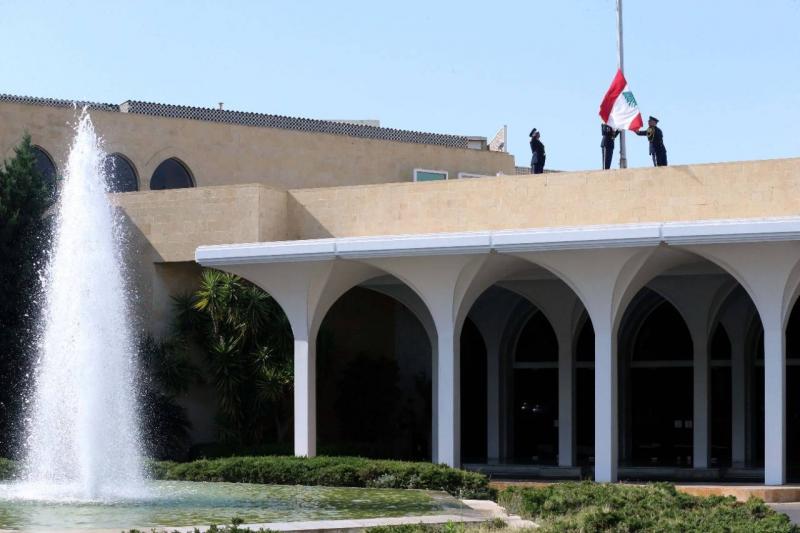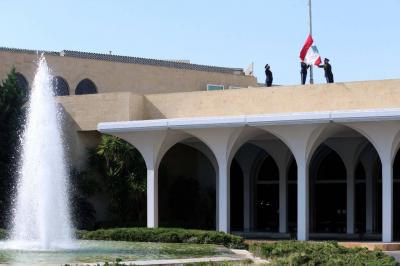With the end of President Michel Aoun's term at midnight on October 31, 2022, and after being unable to elect a new president, the office of the president and the halls of the Council of Ministers and reception were closed today at the Baabda Palace. The Lebanese flag was taken down from the palace balcony and from the flagpole in the external square. All entrances leading to the grand hall and the presidential residence were also closed. Dr. Antoine Chakir, the Director-General of the Presidency, oversaw the measures taken in the presence of Dr. Nabil Chahine, the Director-General of Ceremonies at the Presidency, Brigadier General Bassam al-Halou, Commander of the Presidential Guard Brigade, and Rafiq Shalala, Media Office Chief, with media representatives from various outlets present.
The closure began in the Council of Ministers hall, followed by the entrance to the presidential wing, the president's private meeting rooms and office, particularly the main door with the flag. Everyone then moved to the ambassadors' salon, followed by the 22nd of November salon, the May 25 hall, and the entrance to the president's private residence. Subsequently, the main hall was turned off, and the main entrance was closed. The Lebanese flag was then lowered from the palace balcony and the main flagpole in the external square, and the fountain stopped working, signaling the closure of the presidential wing.
At the end of the tour, Dr. Chakir made the following statement to journalists: "We are in a sad day, and we hope it will not be repeated periodically. Instead of celebrating today the handover of duties to a newly elected president, we are entering a phase of presidential vacancy. We have toured the wings related directly to the President: from the Council of Ministers hall to the president's office, his meeting rooms, as well as the main hall and the main entrance, concluding at the presidential residence. The tour ended with the lowering of the flag from the presidential palace and the main flagpole."
He added: "This situation has caused sorrow in my heart and the hearts of the team members at the directorate general. We are not happy, and we hope that a president will be elected at the earliest opportunity, because the presidency is at the head of constitutional institutions and has now become vacant."
He continued: "The vacancy has become a recurring issue; we are experiencing it for the third time now, and we hope it will not happen again, as I mentioned. What I want to say is that the directorate general of the presidency is the right hand of the president. According to legislative decree No. 111/1959, which refers to administrative organization, the central apparatus of the state consists of: the directorate general of the presidency, the directorate general of the council of ministers, and then other ministries. And we, as the directorate general of the presidency, which is directly linked to the president, are at the head of the central government units. From here, it will remain in place as an institution that operates and has its role. Just as in the case of a presidential vacancy, the powers of the president are vested in the council of ministers, according to the constitution, since we form the executive apparatus for the president, we become the executive apparatus for the council of ministers."
Dr. Chakir clarified: "Our administrative powers derive essentially from the prime minister; whenever any person becomes the head of government, the powers are transferred to the director general of the presidency, because no minister is above the directorate general. Naturally, our administrative head is the prime minister."
In response to a question about his participation in council of ministers sessions if they convene, Dr. Chakir explained: "The director general of the presidency attends council of ministers sessions. Even with a president, he attends the sessions, including those held at the government serail. My presence in these sessions is for the continuity of administrative work in the directorate general, to ensure that there are no deficiencies and to stay updated on what is being discussed in administrative files. When a new president is elected, he will take over what has been resolved; thus, we are the body that follows up."
When asked about the efforts he made yesterday with Prime Minister Mikati regarding forming a government before his travel to Algeria, he said: "I prefer to confine the discussion with you to the topic of the beginning of the vacancy. My visit to Prime Minister Mikati was initiated by me, as director general, where I mentioned that with only hours left before the vacancy, we hope a government could be formed to avoid the sadness we are experiencing today; I had the idea, but it ended yesterday."
Regarding the tasks he will undertake during the presidential vacancy, he said: "Today, we will not work as if there were a president. However, we will continue our institutional and administrative work, and unfortunately, we will take advantage of this period to carry out several improvements to enhance the productivity of the directorate general of the presidency regarding administrative and technological aspects, including electronic programs we are working with, in addition to maintaining equipment, tools, and buildings, as much as we can. We will not undertake major projects due to financial constraints; it is also impossible to enter a project with a new president being elected during its middle. We will try to consolidate the projects we can undertake, which we usually cannot do in the presence of a president."
When asked about the departure of several employees, he noted: "There is a team that comes with the president and leaves with him. Yesterday, the entire team that came with him, such as advisors and experts, had its last day of work; its members submitted their offices and the files they carried to the relevant administrations. The essential staff of the presidency, numbering less than 200, will remain. Some are permanent, and we have a special relationship with the Republican Guard Brigade, which helps us with some administrative tasks, including officers and guards. We are supported humanely by the Republican Guard Brigade, which assists us in all administrative operations, and we are grateful to them for their support; we are in integration with them."
Afterwards, the head of the media office responded to the journalists' questions, clarifying that the wings of the palace dedicated to the president would remain completely closed until the election of a new president and the transfer of duties. No one would be allowed access except for maintenance purposes.
He explained that the work of the media office at the presidency has two aspects: one related to the activities of the president and the directorate general, and the other related to preparing reports and media materials for submission to official references, confirming that the media office would continue, during the vacancy, to cover the work of the directorate general, following a work program prepared by the director general. This will be alongside placing media reports issued from various sectors at the disposal of senior officials according to protocols until a new president is elected, after which work will return to its normal state, covering the activities of the president and the first lady.
Regarding the mechanism that will be followed to enable the media to prepare reports during this stage? He replied: "The goal of today's meeting is for the media outlets, as Dr. Chakir said, to experience the sadness that the directorate general is experiencing. As for the mechanism, we will be ready to facilitate matters for media outlets, but there will be no possibility to use the Council of Ministers halls or other halls."
When questioned about Dr. Chakir's refusal to allow media outlets to access the palace during the previous vacancy, Shalala responded: "We apologized to everyone who requested to use the palace as a platform for interviews, discussions, or debates; the presidential palace is not a space for that. However, if there is a desire to prepare specific reports, we will discuss the matter in coordination with Dr. Chakir and will not complicate matters for the media."
Later, the Director-General of the Presidency chaired a meeting that included directors and heads of offices and departments where the subsequent steps and work program of the directorate general with all its departments and sections during the presidential vacancy were discussed. A memo was issued in the morning regarding the removal of President Aoun's official photo from offices and halls in accordance with the accepted protocol practices upon the end of a president's term.




